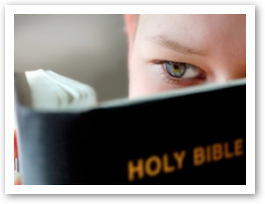Even atheists should read the Bible
- REVEREND WILLIAM INGRAM
Recently, I was asked to speak at a local mothers group. I am a minister, but as it was not a church-based gathering, the organizers had asked me to address the topic of the spiritual life of kids in as non-religious a manner as possible.
"I've seen the promised land. I may not get there with you. But I want you to know tonight, that we, as a people, will get to the promised land."
- Martin Luther King Jr.
 |
To begin, I played an audio excerpt from Martin Luther King Jr.'s last speech, and asked the group to identify the basis for King's reference. I was troubled, though not completely surprised, that those highly educated, progressive, bright young women were not able to identify the story to which King was alluding—that is, Moses's vision of the Promised Land at the completion of the Israelites' wilderness sojourn. Unfortunately, without any awareness of the meaning of King's allusion to the experiences of a group of people who were poised at the brink of a new era after having suffered in the wilderness for years, the full meaning of his words—in the context of his fight for civil rights—was lost.
Our antipathy toward reading the Bible is creating a situation of increasing cultural and intellectual illiteracy. Whether or not one approaches the Bible from the perspective of faith, there can be very little doubt that a lack of understanding of the Bible undermines the ability to fully appreciate the greatest works of art, philosophy, music and literature that our culture has produced. Even Richard Dawkins in The God Delusion asserts, "I am a little taken aback at the biblical ignorance displayed by people educated in more recent decades than I was," and that "an atheistic world-view provides no justification for cutting the Bible, and other sacred books, out of our education."
Biblical literacy is a prerequisite for cultural understanding. The interpretation of the writing of everyone from Shakespeare, Milton and Dickens to John Irving, Maya Angelou and Margaret Atwood (to name but a few) requires an awareness of the biblical narratives. Bach and Bob Marley, Mozart and U2, Beethoven and Dave Matthews—all are steeped in biblical allusions.
Biblical literacy is also necessary to understand many of the metaphorical references that are used in modern society. References to "Good Samaritan" laws or "David and Goliath" sports matches are only two examples of metaphors that become incomprehensible if one has no understanding of the biblical allusions that are being made.
Sadly, our society and our schools are increasingly plagued by a secular hysteria and paranoia when it comes to the Bible. Those who read the Bible, it is assumed, have an anti-intellectual preference for literalist understandings of creationism, narrow-minded approaches to issues of human sexuality, bigoted views of women and superstitious assumptions about the workings of nature.
Ironically, it is only biblical literacy which can overcome such misuses of the biblical narratives. As with any form of religious or secular ideology, the single greatest safeguard against extremist or militant fundamentalism is an informed awareness of the content of the text that the group holds to be authoritative. Only those who understand the Bible, in its fullness, are able to appreciate the nuances, the dialectical tensions, the internal debates, the diversity of perspectives and the startling inconsistencies which have, for millennia, inspired such profound spiritual and intellectual engagements.
Whether we are people of faith or not, we need to recover a degree of biblical literacy—in the Church, in our schools and in our culture—if we truly want to rise to new heights of cultural, philosophical, moral and intellectual accomplishment. So read the Bible. Read it to your kids. It is a great book.
 This is J. Fraser Field, Founder of CERC. I hope you appreciated this piece. We curate these articles especially for believers like you.
This is J. Fraser Field, Founder of CERC. I hope you appreciated this piece. We curate these articles especially for believers like you.
Please show your appreciation by making a $3 donation. CERC is entirely reader supported.

Acknowledgement
The Reverend William Ingram, "Even atheists should read the Bible." National Post, (Canada) February 22, 2010.
Reprinted with permission of the National Post and the Reverend William Ingram.
The Author
The Rev. William Ingram is the Senior Minister at St. Andrew's Church (Presbyterian) in Toronto, Ontario. Prior to serving at St. Andrew's, he served as the minister of Morningside-High Park, Toronto, after graduating from Knox College with a Master's of Divinity degree in 1996. He subsequently completed a Master's of Theology degree from the University of Toronto in Biblical Studies. He is married to Karen, and they have three children—Kate, Madeline and Spencer. He enjoys reading, playing guitar, cooking, travelling, marathon running, sailboat racing, and spending time on wilderness canoe trips with friends.
Copyright © 2010 National Post

